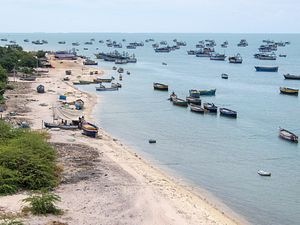For several months now, Indian authorities have been searching for a fishing boat, destined for New Zealand, with perhaps 200 people on board, seeking a better life. The Daya Mata was kitted-out with a 47-day voyage ahead, and is now almost three months overdue.
All – including women, children and infants – are feared lost at sea.
Each adult reportedly paid people smugglers $5,000 and $1,500 per child for a voyage that would risk monsoons and storms in the Indian, Southern, and Pacific oceans, leaving from Munambam harbor in India’s southwest on January 12.
There have been sketchy and unverified sightings near Java in Indonesia. One report said a stockpile of more than 10,000 liters of diesel was running short, along with food, freshwater, and medical supplies.
A further tragedy is that their plight has raised almost no interest at all among ASEAN nations – particularly Thailand, Malaysia, and Indonesia, which should have investigated – or in the Southeast Asian and international press.
ASEAN countries remain a popular transit point for asylum seekers, and Indonesia is a prime destination. According to the UN Refugee Agency Jakarta is hosting about 14,000 refugees from as far afield as Iran and Afghanistan.
However, Indian journalists have attempted to cover the story. That includes another uncorroborated sighting off the east coast of Africa and Interpol has issued Blue Notice to “locate, identify or obtain information on a person of interest in a criminal investigation”.
But the genuine fear is that the Daya Mata has sunk.
Before setting off, passengers posed as tourists staying at local hotels and beach resorts in Cherai, south of Munambam at the entrance of a harbor with access to the Indian Ocean.
Most were from the Ambedkar colony in Delhi and also from Chennai, consisting largely of Tamil refugees who fled Sri Lanka’s 26-year civil war and remain a rich target of opportunity for people smugglers, despite a successful crackdown by the Indian authorities in recent years.
Police have arrested Ravi Sanoop Raja, an ethnic Tamil, Prabhu Dandapani from New Delhi, and 10 middlemen who have also been identified, while the Daya Mata’s part-owner Anil Kumar was detained but released shortly afterwards.
His partner, a Sri Lankan known as Srikanthan and allegedly the ringleader, is wanted for questioning. Srikanthan had apparently singled out Ambedkar and potential passengers whose relatives migrated to Australia a decade earlier.
That was before Australia tightened immigration policies barring entry to refugees arriving by boat. Despite the fact that not one refugee vessel has ever landed in New Zealand, or for that matter on east coast of Australia, the land of the long white cloud was still considered a fair bet.
A police search of Srikanthan’s home found documents written in Tamil along with passbooks for bank accounts, including Switzerland, land titles, six passports and cheques.
Initially, the authorities believed 230 people had boarded but that number has been lowered since 71 packed-bags were found ditched on nearby beaches, indicating some had backed out shortly before the Daya Mata departed, quite possibly upon realizing it was dreadfully overcrowded.
The best guess is that 183 people were on board.
Tamil refugees living in India are caught between a rock and a hard place. More than 60,000 live in refugee camps, another 50,000 in slums across the country, with identity cards imposing restrictions on personal freedoms.
Those that have returned are bitter, complaining they are denied access to their home and lands, education and jobs, amid lingering resentment over a bloody civil war that ended a decade ago thus stifling a post-war repatriation process.
The end result is that many would prefer to find a home in a third country and with the doors to countries like Australia firmly shut people smugglers are looking elsewhere and refugees are dying in the process.
Luke Hunt can be followed on Twitter @lukeanthonyhunt.
































